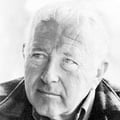
Marcel Lajos Breuer – Lajkó to his friends – was born on 21 May 1902 in the provincial city of Pecs, Hungary. His early study and teaching at the Bauhaus in Weimar and Dessau in the twenties introduced the wonder child to the older giants of the era of whom three – Le Corbusier, Mies van der Rohe, and Walter Gropius – were to have life-long influence upon his professional life.
By the time he left Germany in 1935 to join Gropius in London, Breuer was one of the best-known designers in Europe. His reputation was based upon his invention of tubular steel furniture, one big residence, two apartment houses, some shop interiors and several competition entries.
Two years later, Gropius asked him to join Harvard’s architecture faculty and, during WWII their partnership revolutionized American house design while teaching a whole generation of soon-to-be famous architects.
On his own in New York in 1946, Breuer saw a practice that had been essentially residential finally expand into institutional buildings with the UNESCO Headquarters commission in Paris in 1952 and the first of many buildings for Saint John’s Abbey in Collegeville, MN two years later.
His New York-based firm moved through three ever-larger offices, with a branch in his beloved Paris to handle work in seven European countries; he gathered five young partners in the process.
By 1968, when he won the AIA’s Gold Medal, he could look back on such world-famous monuments as New York’s Whitney Museum (probably the best known), IBM’s La Gaude Laboratory (his personal favourite), the headquarters of the Departments of HUD and HEW in Washington DC (he finally felt American), and Flaine (an entire ski-town in the French Alps). In that same year, he won the first Jefferson Foundation Medal that cited him “among all the living architects of the world as excelling all others in the quality of his work.”
He retired in 1976 and died on the 1st of July 1981 after a long illness.
Website by Marcel Breuer
 Knoll International
Knoll International
 Thonet
Thonet